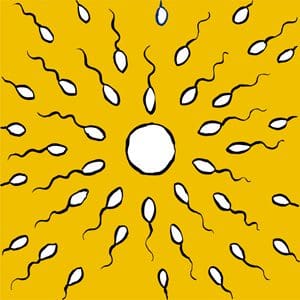Selenium is a mineral with a number of vitally important functions in your body. It is necessary for the production of thyroid hormones, therefore is required for a healthy metabolism. Selenium is also required for the production of your body’s own powerful antioxidant called glutathione peroxidase. This is used by your liver to detoxify your body.
Selenium is truly a powerful antioxidant and it even helps to protect the DNA inside our cells from damage. In this way it helps to boost fertility, particularly in men. A recent study published in Australian Doctor magazine found that when men take antioxidant supplements, their female partners have an increased chance of falling pregnant. Specifically, the study found that the partners of men taking antioxidant supplements were four times more likely to have a live birth than partners of men not taking antioxidants. The antioxidants used in this particular study included selenium, magnesium, zinc, carnitine, and vitamins B, C and E.
Sperm cells are exquisetly sensitive to the effects of environmental chemicals and dietary toxins. Sperm take between 74 and 78 days to form and men are continually producing new sperm. In fact a young and healthy man produces more than four million sperm per hour in each testicle. That sounds exhausting! Because sperm cells are growing and dividing so rapidly, they are very sensitive to harm caused by toxins.
Did you know selenium helps prevent damage to sperm DNA?
How does the DNA inside sperm get damaged? Damage to DNA in any cell in the body (not just sperm cells) is mostly caused by free radicals. Men with high levels of DNA damage have high levels of free radicals in their semen. Free radical damage is caused by radiation, exposure to environmental chemicals, poor diet, lack of antioxidants in the diet and nutrient deficiencies. The combination of chemical exposure and nutrient deficiencies causes the greatest harm. If a man has high levels of vitamins, minerals and essential fatty acids in his diet, they will offer him a great deal of protection against harmful substances in the environment.
It is very interesting to consider that DNA damage inside sperm cells is an indicator of DNA damage inside other cells of the body. Men older than 40 have higher levels of DNA damage inside their sperm. The DNA damage is referred to as DNA fragmentation, and this can be measured with a test called the DNA Fragmentation Index. As all of us get older, mistakes occur more commonly in our DNA as our cells replicate. Also the older we are, the longer we have been exposed to environmental chemicals. These chemicals accumulate inside our bodies and we are said to have a greater “body burden” of chemicals.
Men with high levels of DNA fragmentation inside their sperm cells are more likely to suffer with infertility. Luckily the DNA fragmentation index can be improved with diet and lifestyle improvements, as well as the use of specific nutrients; particularly selenium. The factors that cause low sperm counts and high levels of abnormal sperm are often also responsible for DNA damage inside sperm.
Selenium and male fertility
This mineral is the most important nutrient for male fertility. Selenium protects the DNA inside cells from damage; therefore it protects the DNA inside sperm from fragmentation. (H J Chi et al. Reproduction 2008;23(5):1023-1028) Research has shown that selenium improves the health of Leydig cells inside testes, which are the cells that manufacture testosterone. This has the beneficial effect of improving sperm quality. (Akinloye O et al. Biological Trace Element Research 2005;104:9-18) Selenium also helps to reduce the risk of miscarriage. (Scott R et al. Br J Urol 1998;82:76-80) An optimal level of selenium supplementation is 200 micrograms per day, in the form selenomethionine.

